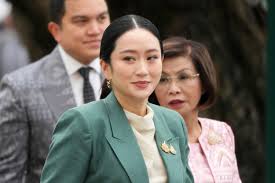Thailand PM PaetongtarnShinawatra suspended over a leaked phone call: Reacts After Court Ruling

In the judgment of 6 to 3, the Constitutional Court of Thailand ruled that Patongtern “lacks qualification and is entitled to prohibited characteristics . Today we will discuss about Thailand PM PaetongtarnShinawatra suspended over a leaked phone call: Reacts After Court Ruling
Thailand PM PaetongtarnShinawatra suspended over a leaked phone call: Reacts After Court Ruling
Thailand’s political landscape was jolted on August 29, 2025, when the Constitutional Court ousted Prime Minister Paetongtarn Shinawatra—after a high-stakes court ruling that confirmed she violated ethical standards. This verdict not only ended the reign of the youngest Thai leader in modern history but also added another twist in the enduring saga of the Shinawatra political dynasty. Rooted in controversy, personal ties, and abrupt legal interventions, the removal has plunged the nation into renewed turmoil. This article explores the context, legal proceedings, fallout, and broader implications of this political earthquake.
Background & Political Context

Paetongtarn Shinawatra, fondly known by her nickname Ung Ing, is the daughter of former Prime Minister Thaksin Shinawatra and niece of ex-PM Yingluck Shinawatra. Appointed as leader of the Pheu Thai Party in late 2023, she became Thailand’s 31st prime minister on August 16, 2024, at just age 38—making her both the youngest PM and the second woman to lead the country .
From the outset, her tenure was fraught with challenges: economic volatility, fragile coalition dynamics, and lingering tensions with Thailand’s conservative establishment, including the powerful military and monarchy. Her predecessor, Srettha Thavisin, had already been ousted by court action—a warning signal of unstable governance .
The Phone Call Leak
On June 15, 2025, amid escalating border violence between Thailand and Cambodia, Paetongtarn made a 17‑minute private call to Hun Sen, Cambodia’s Senate President and former premier. Acting as an interpreter was Phnom Penh’s deputy governor, Khleang Huot .
Three days later, a 9‑minute version of the recording surfaced, followed by the full version posted by Hun Sen on his Facebook page. In the recording:
Paetongtarn referred to Hun Sen as “uncle,” evoking a personal tone rooted in the longstanding friendship between Hun Sen and her father.
She requested sympathy: “please have some sympathy for [his] niece,” and even joked that “people in Thailand are saying I should go be Cambodian prime minister”.
Notably, she assured Hun Sen: “if there’s anything you want, I will take care of it”—a phrase widely perceived as overly submissive
She also criticized a Thai military commander, claiming he spoke for political gain and was aligned with her opponents
The leak immediately triggered backlash from both ends of the political spectrum—nationalists decried her tone as weak and dishonorable, while the military viewed her comment on the commander as an affront. A coalition partner promptly withdrew support, and protests erupted demanding her resignation
Suspension & Legal Proceedings
On July 1, 2025, the Constitutional Court, responding to a petition from 36 senators, unanimously accepted it for consideration and, by a 7–2 vote, suspended Paetongtarn from office pending investigation
Despite her suspension, she was retained in the reshuffled cabinet as Minister of Culture, a move seen by some as a way to preserve her political relevance during the proceedings
Acting Prime Minister Duty passed first to Suriya Juangroongruangkit, the Deputy PM and Transport Minister, and then to Phumtham Wechayachai due to reshuffling and royal endorsement procedures
Further intensifying the crisis, the Office of the National Anti-Corruption Commission (NACC) launched a parallel inquiry, which had the potential to lead to additional legal consequences, including prison
Public & Political Fallout
The fallout from the phone leak was swift and intense:
The Bhumjaithai Party, a key coalition ally, withdrew its support on June 18, citing national disgrace—a move that unraveled the government’s majority .
Protests erupted in Bangkok. On June 28, around 6,000 demonstrators rallied at Victory Monument calling for Paetongtarn’s resignation, branding her a “traitor” and accusing her of appeasing Cambodia.
Her approval rating plummeted—from roughly 30.9% in March to about 9.2% by late June
Investment and economic confidence suffered: Thailand’s stock market plunged, hitting its lowest point in over five years.
Analysts warned the crisis underscored persistent instability and the power of non-elective institutions—the courts, military, and monarchy—in undermining elected leadership
6. Court Removal Verdict & Aftermath
On August 29, 2025, at 15:00 local time, the Constitutional Court delivered its final verdict: Paetongtarn was removed from office, with the court ruling 6–3 that she had violated national ethical norms and placed personal ties above the country’s interests
In her public statement, she accepted the judgment, asserting that she “never asked for anything for [her] own benefit” and emphasized her allegiance to Thailand’s people, monarchy, and religion
She became the fourth member of the Shinawatra family to be toppled before completing a term: following Thaksin (coup in 2006), Yingluck (court removal coup 2014), and her cousin Srettha earlier in 2024
Her removal intensified political instability:
The absence of a clear successor and a fragmented coalition raised the prospect of early elections—possibly by April 2026
Phumtham Wechayachai continues to serve as caretaker PM.
Analysts speculate whether Thaksin Shinawatra might attempt a comeback—but face eroded public support and failed promises by Pheu Thai
The dynastic power of the Shinawatras appears significantly weakened as Thailand confronts a recurring cycle of judicial intervention and weakened democratic governance
Analysis & Broader Implications
Democratic fragility and institutional overreach
The removal of Paetongtarn underscores the precarious nature of Thai democracy, where unelected institutions frequently override popular mandates. Courts and the military maintain substantial power to depose leaders—born from a political culture that distrusts electoral populism and favors conservative, establishment control .
Dynastic fatigue?
The repeated ousting of Shinawatra family members suggests growing public and institutional fatigue. The Shinawatra brand—once a symbol of populist hope—is now burdened by perceived entitlement, repeated scandals, and failure to deliver economic progress
Strategic missteps & political tone
Paetongtarn’s misjudged tone during the phone call—referring to Hun Sen as “uncle” and downplaying military authority—was perceived as weak and dismissive of national pride. It illustrates how personal diplomacy, when leaked, can backfire spectacularly in a militarized, nationalist political environment
Potential reforms or more instability?
Many Thai scholars argue that without institutional reforms—particularly reducing the political power of courts and the military—Thailand will repeatedly cycle through unstable governments. Critics advocate for a more robust democratic framework capable of withstanding charismatic leadership and dynastic influence
Looking ahead
The political vacuum may invite a military-backed administration or an interim coalition. Calls for constitutional amendments and an early election are surfacing, though they may simply reset the cycle. Whether Thailand’s next chapter can break free from this turbulence remains uncertain.
Conclusion
The removal of Prime Minister Paetongtarn Shinawatra marks both a personal fall and a broader indictment of Thailand’s fragile democratic systems. Her trajectory—from youthful promise to political exile—reflects a shocking recurrence: elected power curtailed by institutional resistance. The leaked phone call, once a diplomatic overture, became a lightning rod that exposed endemic vulnerabilities.
As caretaker administrations jockey for control and coalition politics falters, the future remains in flux. Thailand stands at a crossroads: pursue democratic reforms to stabilize governance, or continue repeating patterns of political upheaval that undermine public trust. Paetongtarn’s fall, thus, is more than a singular scandal—it is symptomatic of a nation grappling with the balance between popular will and entrenched power.
How useful was this post?
Click on a star to rate it!
Average rating 0 / 5. Vote count: 0
No votes so far! Be the first to rate this post.
About the Author
usa5911.com
Administrator
Hi, I’m Gurdeep Singh, a professional content writer from India with over 3 years of experience in the field. I specialize in covering U.S. politics, delivering timely and engaging content tailored specifically for an American audience. Along with my dedicated team, we track and report on all the latest political trends, news, and in-depth analysis shaping the United States today. Our goal is to provide clear, factual, and compelling content that keeps readers informed and engaged with the ever-changing political landscape.




